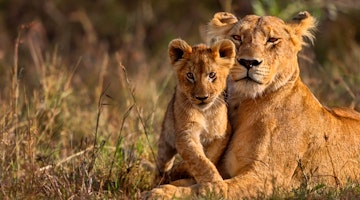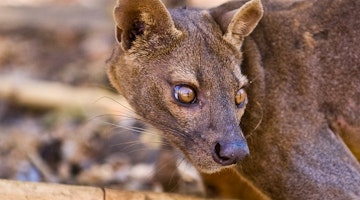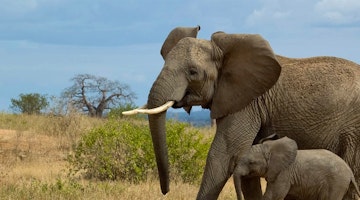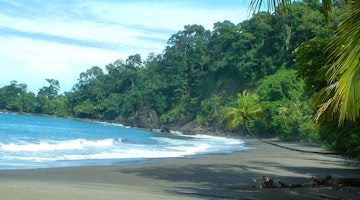FAQ
Helen Kennedy has travelled extensively throughout Africa (including Sierra Leone) and here she answers questions about travel in Sierra Leone. Our Frequently Asked Questions pages are intended to help you decide if a particular destination is right for you. Our team is always keen to chat so if you’d like to find out more, you can email or ring for firsthand advice.
Why visit Sierra Leone?
I think Sierra Leone is one of West Africa's most enticing holiday destinations and a trip here is an exciting journey into undiscovered Africa... and you won't find that many of your friends will have been there! The people are incredibly friendly and you will find 400 kilometres of often lovely and virtually deserted white sand beaches and a fascinating heritage entwined with the abolition of slavery. Inland, the country is covered with the lush forests, containing some of highest concentrations of primates and birds in the world. Overall, the wildlife is fascinating and for seasoned Africa travellers, the Upper Guinea Forest ecoystem offers something refreshingly new and very different.
How do we get there?
Brussels Airlines operates regular flights from London Heathrow and selected other UK airports to Freetown via Brussels. Please note that flights are quoted based on published fares, so fares will be subject to change until tickets have been issued. Air France also operates regular flights from selected UK airports to Freetown via Paris CDG.
How do we travel around the country?
Travel around the country is by four-wheel drive vehicles and sometimes by local boats. Petrol is expensive so this often represents a significant element of the cost of a holiday.
If there was one thing I shouldn’t miss, what would you recommend?
It really does depend on your interests: if history is of interest to you then Bunce Island is a must, which was one of the largest slave castles in West Africa. Those who want to chill at the beach, should go to the beautiful peninsula beaches or Banana Islands. Wildlife enthusiasts should visit Tiwai Island and birders must include Gola Rainforest National Park in any itinerary. Just be aware that accommodations at both Tiwai and Gola are very basic, having been built for researchers rather than tourists.
Is Sierra Leone safe?
Sierra Leone, as many people know has had a difficult past, but this should not put anyone off travel now as the troubles, including Ebola, are long gone. The overwhelming theme of the feedback we have received from our past guests, has been how welcoming and friendly the people are. As in many countries in Africa it is always best to leave valuables behind, and if you do take them with you, be careful not to leave them out on show. It sounds obvious but always listen to the advice of your guides.
Can I drink the tap water?
No. You should avoid tap water. Instead drink bottled water. Always check the bottle is sealed.
Is English widely spoken?
Krio is the first language along with a selection of regional others like Mende (mainly in the east and south) and Temne (mainly in the north and west). English is the language of business and government and so it is widely understood in Freetown, however less so out of town. It is often appreciated if you greet people in Krio by saying - ''aw-di bodi?'' - a combination of hello and how are you? The reply is 'di bodi fine'.
Should I expect very basic facilities in all Sierra Leone hotels and lodges?
Not all, but most will be basic or simple. Accommodation in Sierra Leone is not of the same standard as in other more developed African countries. We endeavour to use the best accommodation available in each area and where possible we opt for locally owned hotels, lodges or guesthouses. However, you must be prepared for accommodation to not necessarily have hot water and for electricity to be intermittent and unreliable. We’ll always let you know exactly what to expect… sometimes it really is more about the fabulous locations and the overall experience.
What is the local food like?
Lots of rice and cassava with various sauces... beans and plantain are common side dishes. And of course seafood - barracuda, ladyfish, snapper, lobster and crab are all common and very fresh! Chicken is also widely available and often served with chips in the towns. Breakfast often consists of omelette and bread which may be toasted.
How much of a culture shock is travelling to Sierra Leone?
Sierra Leone is one of the poorest countries in the world so you must be prepared to see extreme poverty and a real lack of basic amenities and infrastructure in many areas. You need to be flexible when travelling here - go with an open mind and as so often happens, you'll come back enthralled and in love with the people and the country as a whole.
How can I contribute to the local economy and conservation programmes?
By travelling with us to Sierra Leone you are helping the local economy as our ground handler is locally based and employs the guides and drivers from the local community. Also, its likely you’ll be staying in local-owned accommodation, adding directly to people’s basic income. Buying local foods and produce is a good direct way to contribute to the local economy. Also buying presents for people back home in the markets or from small shops helps to support local businesses and individual craftsmen. By visiting the protected forests you make a significant contribution to conservation initiatives under way there.
Do I need to get any vaccinations ahead of travel and/or malaria tablets?
Yes, you will need to speak to your GP or travel clinic to find out what is required about six weeks before travel. Sierra Leone is malarial and a Yellow Fever certificate is required to be shown on entry into the country.
I’m pregnant, can I travel to Sierra Leone?
Again you should consult your doctor on whether you should travel. We wouldn’t advise it especially as it is in a malarial zone.
Next steps
Ring or email us if you'd like to start planning a trip.
Helen Kennedy
Travel Specialist
Looking for inspiration?
You'll find expert travel guides, holiday ideas and insider tips now on the Rainbow blog

Top 5 First Time Safari Destinations

Salar De Uyuni - The World's Largest Salt Flat


10 Strange Animals and Where to Go to See them


Top five South Africa Safari lodges

Sustainable Tourism In Corcovado National Park, Costa Rica

Why Choose Us?
Passionate travel experts
- We've been leading wildlife travel since our first South Africa tours over 25 years ago
- Our Travel Specialists have lived in their specialist area for years
- We work with local guides to immerse you deeper in our diverse range of experiences
Personal & tailor-made
- You'll speak to your own expert who'll share their first-hand knowledge
- We'll make your itinerary seamless with 24/7 emergency contact available
- Your Travel Specialist will listen to ensure you have the best chance of seeing the wildlife you love
Responsible by nature
- We take care to actively contribute to the conservation of environments we visit
- For select countries, we make a charitable donation on your behalf when you make your booking
- We've partnered with conservation experts and NGOs to curate responsible tours
For the latest travel advice from the Foreign, Commonwealth and Development Office check www.gov.uk/travelaware
